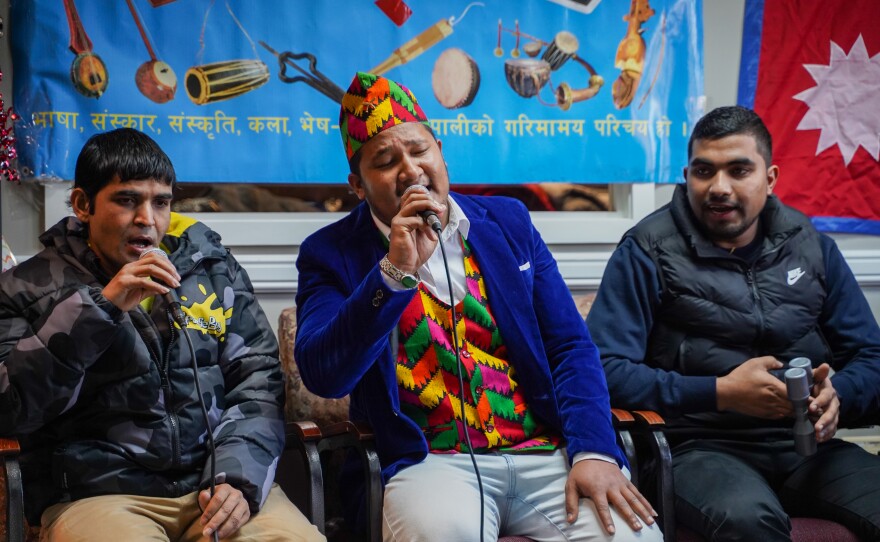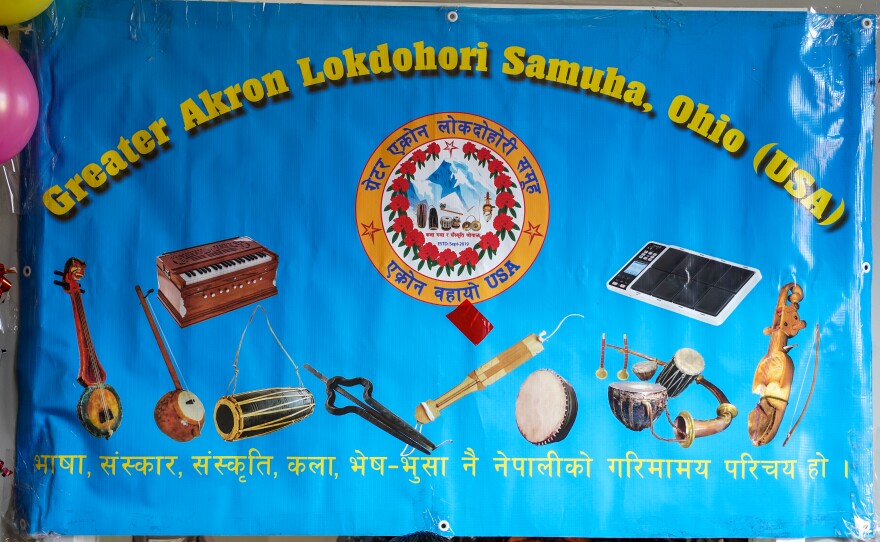Randhoj Pandhak, a thin Bhutanese man in his fifties, sits cross-legged on his couch in the early evening, playing his madal. The madal is a long drum with a short diameter that is a staple of traditional Nepali music.
Pandhak is one of the over 5,000 refugees who originated in Bhutan, spent decades in refugee camps in Nepal and then resettled in Akron.
"I played (music) in Bhutan, in my country," said Pandhak. "But in Nepal, I stayed more than 18 to 20 years. I didn't play there."
In Nepali refugee camps, without music
Pandhak also sang traditional Nepali folk songs and played the bansuri, a bamboo flute that is a pillar — along with the harmonium and madal — of Nepali music. But he made no music in the Nepalese refugee camps, a time of his life he describes as stressful and challenging.
"I totally forgot that time. We came to Nepal and it’s very difficult situation, I forget everything, my mind is not working," says Pandhak.
"We speak Nepali," said Pandhak, "the Bhutanese national language is Dzongkha."
Bhutan, like Nepal, is a landlocked nation between China and India. Though Bhutan doesn’t border Nepal directly, both are in similar geographic locations in the Eastern Himalayas, and Bhutan has two distinct ethnic groups among its people. Most are ethnically descended from Tibet and speak a Tibetic language called Dzongkha. However, a large population of ethnically Nepalese people settled in Bhutan during the 20th century, speaking Nepalese.
These people, known as Lhotshampa, were primarily subsistence farmers in their homeland of Bhutan. In the late 1980s, the government enacted the "One Nation, One People" policy, which led to the expulsion of over 100,000 ethnically Nepalese people. Pandhak and his family were among the many that fled to refugee camps in Nepal.
"In Bhutan, we were farmers. In Nepal, we stayed in the (refugee) camp. UNHCR (United Nations High Commissioner for Refugees) helped us with everything — house, food and clothing, school," said Pandhak. "That’s why we stayed."
Rediscovering community and culture
Among the many pernicious effects of being displaced is losing the ability to pursue one's passions and hobbies. Pandhak and other Lhotshampa who experienced expulsion from Bhutan and then years living in refugee camps, lost their ability to do the things they love, like playing music.
"In Nepal we, when we came from Bhutan in Nepal, the situation is not good. We stay in the small hut. This is the small house made with bamboo. So that time we are in a cage," said Pandhak. "We can’t go to the outside. That is the rule of staying there. So that our mind is actually not working good that time. So I can’t remember the music."
In Akron, Pandhak remembers the music once again and has reclaimed his love.
"My flute teacher is Sushil Bishwakarma, a well-known musician. Because, for 33 years in Nepal, in 'Radio Nepal,' he was sharp," said Pandhak of his teacher, an internationally renowned bansuri player. "And he was retired from there. Then he came here."
Bishwakarma and other Lhotshampa musicians have gathered in Northeast Ohio and rekindled their musical traditions. There are multiple Lhotshampa bands working in the Akron and Cleveland areas, including the popular Druk Fusion Band, and Randhoj's own band, Typical Bansuri Band.
Another way Pandhak and the Lhotshampa refugees keep their traditions alive is at the "Greater Akron Lok Dohori Samuha." Lok Dohori, or just Dohori, is a unique form of music that is performed both cooperatively and competitively. Two groups of musicians — usually male and female, each behind a leader — trade spontaneously improvised verses in a conversation with each other.
The lyrics of the Dohori, which focus on things like travel, farming, raising families and the pitfalls of marriage in an unforgiving world, reflect the intricacies of life in Bhutan.
Pandhak spent nearly two decades living without the ability to communicate these culturally significant expressions of his people. He relishes the freedom to do that again in his new home.
"I am not the professional music player, but I like it and I try to learn something," said Pandhak. "And when I play the music, flute or the vocal or madal, then I am happy at that time."


















